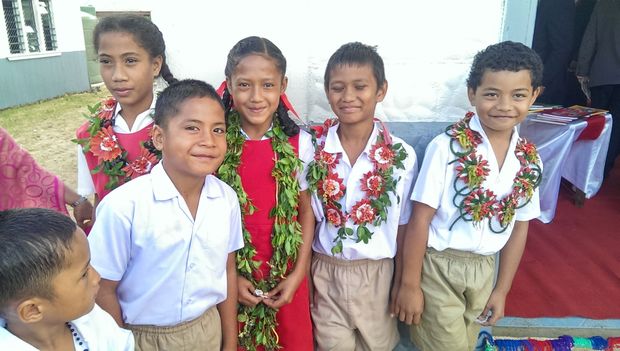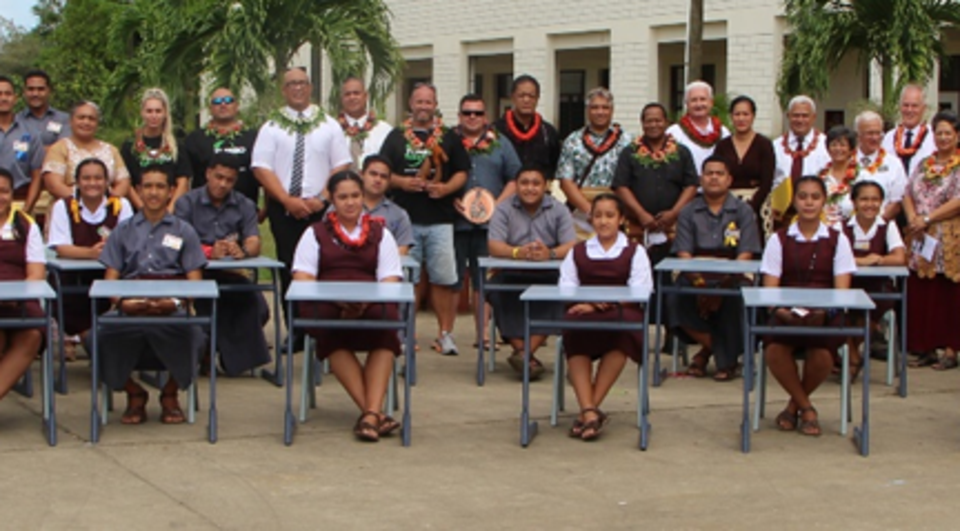Former Minister of Education concerned about proposed language policy Featured
 Dr. 'Ana Maui Taufe'ulungaki, Former Minister of Education
Dr. 'Ana Maui Taufe'ulungaki, Former Minister of Education
15 March, 2021. Former education minister and Tongan academic is calling for the Ministry of Education to reconsider their plans to amend the Tongan language policy.

School children from Tonga's Ha'apai Islands.
Last month Education Minister, Siaosi Sovaleni, announced plans to introduce English as a second language for classes one to three. The English language was currently being offered to students in class three through song and poetry.
Tongan academic, Dr 'Ana Taufe'ulungaki, said there were two reasons as to why she believed the English language should not be taught at such a young age.
Taufe'ulungaki said global research revealed that the best language to teach a child was their mother tongue, a language in which both child and teacher could communicate and understand each other in.
The maintenance of the Tongan language in the long term was another point Taufe'ulungaki stressed, "as studies have shown that if you do not teach the language to the next generation, the language is likely to be lost," she said.
"The Tongan language is already at risk and I'm seeing an increase in parents using English as the main language at home. If you think about the broader context here in which we apply the Tongan language, if we are not careful of what we do in education and at home, we can safely say that our language would disappear in the next generation or so.
"The Tongan language is one of the strong indicators of our identity as Tongans. Tonga is the home of the Tongan language and if Tonga does not privilege its own language in its home country, who else would privilege the language?"
Science offered a much more complex view of the relationship with languages evolves over a lifetime - and there is much to encourage late beginners.
"As babies, we have a better ear for different sounds; as toddlers, we can pick up native accents with astonishing speed.

"As adults, we have longer attention spans and crucial skills like literacy that allow us to continually expand our vocabulary, even in our own language.
"And a wealth of factors beyond ageing - like social circumstances, teaching methods, and even love and friendship - can affect how many languages we speak and how well."
A study by researchers in Israel found, for example, that adults were better at grasping an artificial language rule and applying it to new words in a lab setting.
The scientists compared three separate groups: 8-year-olds, 12-year-olds, and young adults. The adults scored higher than both younger groups, and the 12-year-olds also did better than the younger children.
This chimed with the results of a long-term study of almost 2,000 Catalan-Spanish bilingual learners of English: the late starters acquired the new language faster than the younger starters.
Dr Taufe'ulungaki said that with the studies that have been done globally, she would prefer for the English language to be introduced at high school level.
"According to research, a child does not master his or her first language until he or she is about 12 years of age and so if we want the foundation of Tongan to be firm and strong, then we need to delay the introduction of the English language to a later stage until we are certain that our children are strong in their mother tongue.
"But of course politically that would not be acceptable and many parents are now up in arms about the delay of the introduction of English, which is one of the reasons the view was recommended that English be re-introduced as it used to be in the old days at class one," she explained.
However, Taufe'ulungaki did mention that Sovaleni had announced to local media that the government was reviewing the policy and the planned amendments were not confirmed, as they are still considering them.
- RNZI



